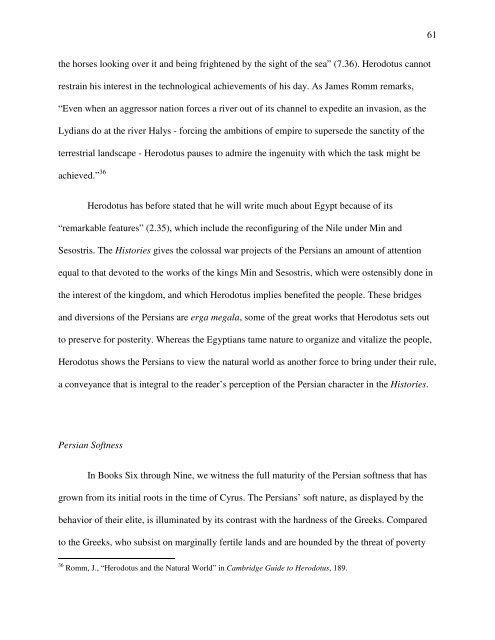The Old and the Restless - The Egyptians and the Scythians in Herodotus' Histories by Robert J. Hagan
You also want an ePaper? Increase the reach of your titles
YUMPU automatically turns print PDFs into web optimized ePapers that Google loves.
61<br />
<strong>the</strong> horses look<strong>in</strong>g over it <strong>and</strong> be<strong>in</strong>g frightened <strong>by</strong> <strong>the</strong> sight of <strong>the</strong> sea” (7.36). Herodotus cannot<br />
restra<strong>in</strong> his <strong>in</strong>terest <strong>in</strong> <strong>the</strong> technological achievements of his day. As James Romm remarks,<br />
“Even when an aggressor nation forces a river out of its channel to expedite an <strong>in</strong>vasion, as <strong>the</strong><br />
Lydians do at <strong>the</strong> river Halys - forc<strong>in</strong>g <strong>the</strong> ambitions of empire to supersede <strong>the</strong> sanctity of <strong>the</strong><br />
terrestrial l<strong>and</strong>scape - Herodotus pauses to admire <strong>the</strong> <strong>in</strong>genuity with which <strong>the</strong> task might be<br />
achieved.” 36<br />
Herodotus has before stated that he will write much about Egypt because of its<br />
“remarkable features” (2.35), which <strong>in</strong>clude <strong>the</strong> reconfigur<strong>in</strong>g of <strong>the</strong> Nile under M<strong>in</strong> <strong>and</strong><br />
Sesostris. <strong>The</strong> <strong>Histories</strong> gives <strong>the</strong> colossal war projects of <strong>the</strong> Persians an amount of attention<br />
equal to that devoted to <strong>the</strong> works of <strong>the</strong> k<strong>in</strong>gs M<strong>in</strong> <strong>and</strong> Sesostris, which were ostensibly done <strong>in</strong><br />
<strong>the</strong> <strong>in</strong>terest of <strong>the</strong> k<strong>in</strong>gdom, <strong>and</strong> which Herodotus implies benefited <strong>the</strong> people. <strong>The</strong>se bridges<br />
<strong>and</strong> diversions of <strong>the</strong> Persians are erga megala, some of <strong>the</strong> great works that Herodotus sets out<br />
to preserve for posterity. Whereas <strong>the</strong> <strong>Egyptians</strong> tame nature to organize <strong>and</strong> vitalize <strong>the</strong> people,<br />
Herodotus shows <strong>the</strong> Persians to view <strong>the</strong> natural world as ano<strong>the</strong>r force to br<strong>in</strong>g under <strong>the</strong>ir rule,<br />
a conveyance that is <strong>in</strong>tegral to <strong>the</strong> reader’s perception of <strong>the</strong> Persian character <strong>in</strong> <strong>the</strong> <strong>Histories</strong>.<br />
Persian Softness<br />
In Books Six through N<strong>in</strong>e, we witness <strong>the</strong> full maturity of <strong>the</strong> Persian softness that has<br />
grown from its <strong>in</strong>itial roots <strong>in</strong> <strong>the</strong> time of Cyrus. <strong>The</strong> Persians’ soft nature, as displayed <strong>by</strong> <strong>the</strong><br />
behavior of <strong>the</strong>ir elite, is illum<strong>in</strong>ated <strong>by</strong> its contrast with <strong>the</strong> hardness of <strong>the</strong> Greeks. Compared<br />
to <strong>the</strong> Greeks, who subsist on marg<strong>in</strong>ally fertile l<strong>and</strong>s <strong>and</strong> are hounded <strong>by</strong> <strong>the</strong> threat of poverty<br />
36 Romm, J., “Herodotus <strong>and</strong> <strong>the</strong> Natural World” <strong>in</strong> Cambridge Guide to Herodotus, 189.
















